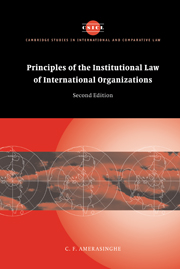Crossref Citations
This Book has been
cited by the following publications. This list is generated based on data provided by Crossref.
Serrano, Antonio Segura
2007.
El derecho internacional humanitario y las operaciones de mantenimiento de la paz de Naciones Unidas.
p.
217.
Brinsmead, Simon Winston
2007.
Rulemaking in ICAO, the ILO and the IMF: The Rise of Standards.
SSRN Electronic Journal,
Papastavridis, Efthymios
2007.
Interpretation of Security Council Resolutions under Chapter VII in the Aftermath of the Iraqi Crisis.
International and Comparative Law Quarterly,
Vol. 56,
Issue. 1,
p.
83.
Macey-Dare, Rupert
2007.
Harassment Claims and the Jurisdiction of International Administrative Law Tribunals.
SSRN Electronic Journal,
Acquaviva, Guido
2009.
Non-State Actors from the Perspective of International Criminal Tribunals.
SSRN Electronic Journal,
Opeskin, Brian
2009.
The Influence of International Law on the International Movement of Persons.
SSRN Electronic Journal,
Bantekas, Ilias
2009.
Trust Funds under International Law.
p.
113.
Greppi, Edoardo
2009.
The 1998–2000 War between Eritrea and Ethiopia.
p.
55.
Gulati, Rishi
2010.
The Internal Dispute Resolution Regime of the United Nations – Has the Creation of the United Nations Dispute Tribunal and United Nations Appeals Tribunal Remedied the Flaws of the United Nations Administrative Tribunal?.
SSRN Electronic Journal,
Sari, Aurel
2011.
EU External Relations Law and Policy in the Post-Lisbon Era.
p.
59.
Paun, Christopher J.
2011.
Between Collaboration and Competition: Global Public-Private Partnerships Against Intellectual Property Crimes.
SSRN Electronic Journal,
Maus, Sylvia
2011.
International Law and Humanitarian Assistance.
p.
103.
Armingeon, Klaus
Milewicz, Karolina
Peter, Simone
and
Peters, Anne
2011.
The Prospects of International Trade Regulation.
p.
69.
Smyth, Sophie E.
2012.
Agency and Accountability in Multilateral Development Finance: An Agenda for Change.
SSRN Electronic Journal,
Crawford, James
and
Koskenniemi, Martti
2012.
The Cambridge Companion to International Law.
Maus, Sylvia
2012.
The UNESCO Convention on the Protection and Promotion of the Diversity of Cultural Expressions.
p.
555.
2013.
Legal Resolution of Nuclear Non-Proliferation Disputes.
p.
19.
Goldmann, Matthias
2013.
Human Rights and Sovereign Debt Workouts.
SSRN Electronic Journal,
Blanke, Hermann-Josef
and
Mangiameli, Stelio
2013.
The Treaty on European Union (TEU).
p.
981.
Borda, Aldo Zammit
2013.
An Overview of the Commonwealth Secretariat Arbitral Tribunal and Its Use of Discretion in Employment-Related Judgments.
Oxford University Commonwealth Law Journal,
Vol. 13,
Issue. 2,
p.
313.





